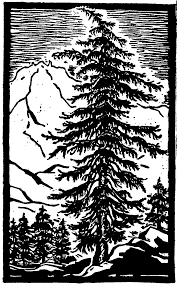In college my willowy friend Dan (all 6’7″ and 140 lbs. of him) dressed in green pants and a green long sleeve t-shirt and green gloves and wore a green hat with a glittery silver cardboard star affixed on the pom. (His shoes and socks were brown.) He then managed to wrap himself in strands of the old school large bulb colored lights and went to some post-finals holiday party or another as a Christmas tree. Occasionally he would find an outlet and plug himself in.
 Dressing as a tree and acting like a tree are two different things I suppose (just like poetry and chopped-up prose are two different things?).
Dressing as a tree and acting like a tree are two different things I suppose (just like poetry and chopped-up prose are two different things?).
I suppose there’s nothing wrong with Jonathan Aaron’s poem that appears in the December 15, 2008, issue of the New Yorker but there’s not a lot there to make me care. The transfiguration is a nice moment and the tree names (hemlock forever makes me think of Keats) and the quizzical look from the little girl but I feel like I’ve run across so many of these plain-spoken, formulaic beginning-middle-epiphany poems that could easily be flash fiction that I’ve become hard to them like an old baguette to a rusty knife. I try to be receptive but my heart is shriveled and cold.
 But there are two things that I really really really don’t like about contemporary poetry: the prose poem (make up your mind already; is it prose or is it a poem?) and the poem that wouldn’t lose anything if it were a prose poem. I don’t believe in the prose poem (it’s like Santa Claus or mud baths or Allen Ginsberg) and just like you can’t make a Reuben without the sauerkraut, you can’t call something a poem that doesn’t have lines. The content and form of a poem can take on many qualities but the line is essential. In the olden days, the line represented a unit of breath and in many cases it still does. (Many free verse practitioners break their lines at the natural, breath-taking spot.) So no lines, no poem.
But there are two things that I really really really don’t like about contemporary poetry: the prose poem (make up your mind already; is it prose or is it a poem?) and the poem that wouldn’t lose anything if it were a prose poem. I don’t believe in the prose poem (it’s like Santa Claus or mud baths or Allen Ginsberg) and just like you can’t make a Reuben without the sauerkraut, you can’t call something a poem that doesn’t have lines. The content and form of a poem can take on many qualities but the line is essential. In the olden days, the line represented a unit of breath and in many cases it still does. (Many free verse practitioners break their lines at the natural, breath-taking spot.) So no lines, no poem.
The form commonly known as the prose poem is what I call in my own private circle of one “flash fiction” and is not without its merits. It’s an interesting form in its own right, just get it out of the poetry journals.
But far worse than the prose poem is the poem that could be a prose poem. The prose poem has always been slinking around in the shadowy doorways, hideous and disfigured. The poem that could be a prose poem dresses up in its finest and enjoys mimosas and biscuits among the poems that can only be poetry at the grandest balls.
While it wasn’t my intent to use Jonathan Aaron’s face as a soapbox (because he seems like a nice guy who faces the difficult task every day of writing well-wrought poems) here I am and my mouth is moving. What happens if to Aaron’s poem if you take away the line breaks? Does it read as a passage from a story or novel instead of a poem? That, I suppose, is a risk of writing free verse narrative poems; they could easily be passages from other works. Narrative poetry written in form faces similar issues however it makes use of the more traditional poetry-making tools (like meter and rhyme) and so doesn’t as readily slip into the possible prose camp.
But Aaron’s poem is not a paragraph; it is a poem and it should be treated as such. And in the end Aaron uses nice, clean laanguage and chooses a scene that many of us are familiar with: a holiday party (probably hosted by the office dullard) and all we want to do is escape. And he picks a novel way of escaping. I really do like how the mountaintop quiet comes through at the end of the poem, which has a finality (Yeats described it as the satisfying click when a fine jewelry box snaps shut) and so that saves it from its lesser brethren.
Just not my cup of egg nog, you know?
Further Reading
Aaron reading a poem on film noir.
On poetry and holiday parties.
A quicky review of Aaron’s Corridors.
Totally Unrelated


Leave a comment
Comments feed for this article